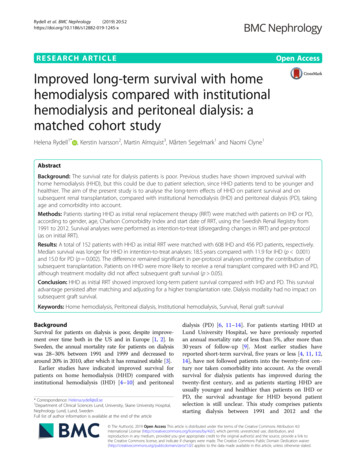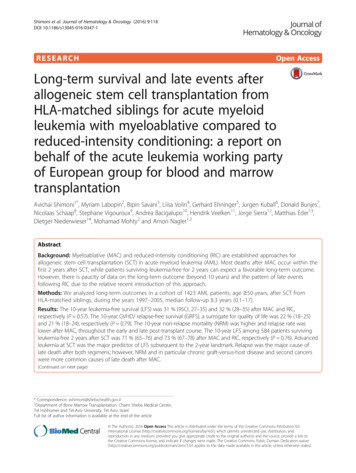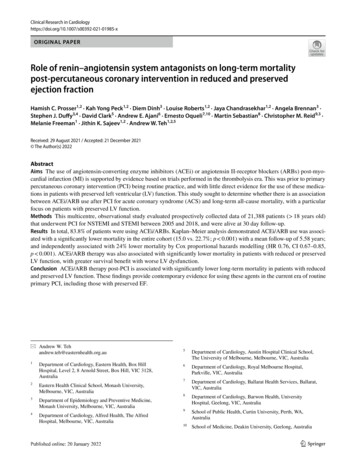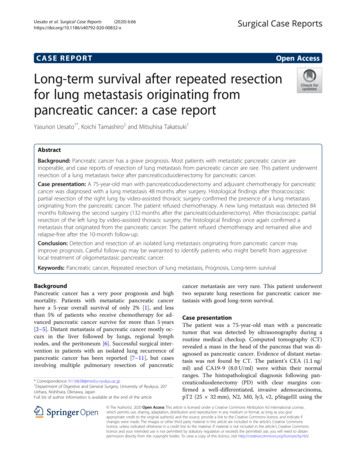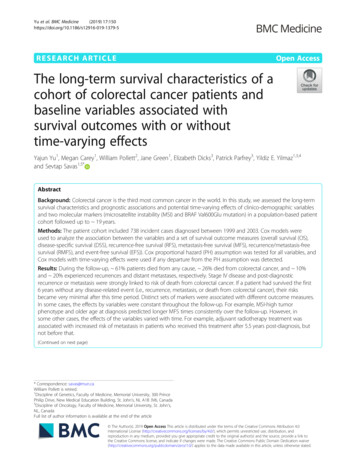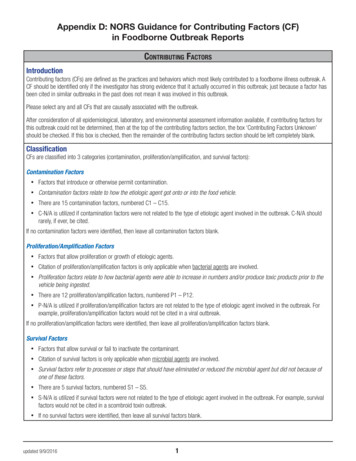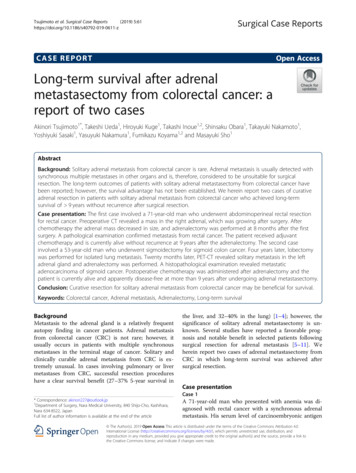
Transcription
Tsujimoto et al. Surgical Case Reports(2019) 5:61https://doi.org/10.1186/s40792-019-0611-zCASE REPORTOpen AccessLong-term survival after adrenalmetastasectomy from colorectal cancer: areport of two casesAkinori Tsujimoto1*, Takeshi Ueda1, Hiroyuki Kuge1, Takashi Inoue1,2, Shinsaku Obara1, Takayuki Nakamoto1,Yoshiyuki Sasaki1, Yasuyuki Nakamura1, Fumikazu Koyama1,2 and Masayuki Sho1AbstractBackground: Solitary adrenal metastasis from colorectal cancer is rare. Adrenal metastasis is usually detected withsynchronous multiple metastases in other organs and is, therefore, considered to be unsuitable for surgicalresection. The long-term outcomes of patients with solitary adrenal metastasectomy from colorectal cancer havebeen reported; however, the survival advantage has not been established. We herein report two cases of curativeadrenal resection in patients with solitary adrenal metastasis from colorectal cancer who achieved long-termsurvival of 9 years without recurrence after surgical resection.Case presentation: The first case involved a 71-year-old man who underwent abdominoperineal rectal resectionfor rectal cancer. Preoperative CT revealed a mass in the right adrenal, which was growing after surgery. Afterchemotherapy the adrenal mass decreased in size, and adrenalectomy was performed at 8 months after the firstsurgery. A pathological examination confirmed metastasis from rectal cancer. The patient received adjuvantchemotherapy and is currently alive without recurrence at 9 years after the adrenalectomy. The second caseinvolved a 53-year-old man who underwent sigmoidectomy for sigmoid colon cancer. Four years later, lobectomywas performed for isolated lung metastasis. Twenty months later, PET-CT revealed solitary metastasis in the leftadrenal gland and adrenalectomy was performed. A histopathological examination revealed metastaticadenocarcinoma of sigmoid cancer. Postoperative chemotherapy was administered after adrenalectomy and thepatient is currently alive and apparently disease-free at more than 9 years after undergoing adrenal metastasectomy.Conclusion: Curative resection for solitary adrenal metastasis from colorectal cancer may be beneficial for survival.Keywords: Colorectal cancer, Adrenal metastasis, Adrenalectomy, Long-term survivalBackgroundMetastasis to the adrenal gland is a relatively frequentautopsy finding in cancer patients. Adrenal metastasisfrom colorectal cancer (CRC) is not rare; however, itusually occurs in patients with multiple synchronousmetastases in the terminal stage of cancer. Solitary andclinically curable adrenal metastasis from CRC is extremely unusual. In cases involving pulmonary or livermetastases from CRC, successful resection procedureshave a clear survival benefit (27–37% 5-year survival inthe liver, and 32–40% in the lung) [1–4]; however, thesignificance of solitary adrenal metastasectomy is unknown. Several studies have reported a favorable prognosis and notable benefit in selected patients followingsurgical resection for adrenal metastasis [5–11]. Weherein report two cases of adrenal metastasectomy fromCRC in which long-term survival was achieved aftersurgical resection.Case presentationCase 1* Correspondence: akinori227@outlook.jp1Department of Surgery, Nara Medical University, 840 Shijo-Cho, Kashihara,Nara 634-8522, JapanFull list of author information is available at the end of the articleA 71-year-old man who presented with anemia was diagnosed with rectal cancer with a synchronous adrenalmetastasis. His serum level of carcinoembryonic antigen The Author(s). 2019 Open Access This article is distributed under the terms of the Creative Commons Attribution 4.0International License (http://creativecommons.org/licenses/by/4.0/), which permits unrestricted use, distribution, andreproduction in any medium, provided you give appropriate credit to the original author(s) and the source, provide a link tothe Creative Commons license, and indicate if changes were made.
Tsujimoto et al. Surgical Case Reports(2019) 5:61Page 2 of 6Case 2Preoperative laboratory analyses, including the serum levelof CEA (0.8 ng/ml), showed no abnormalities. After surgery, chemotherapy with 5-fluorouracil and folinic acidfollowed by tegafur uracil were administered. At 46months after the operation, the patient’s CEA level increased to 13.9 ng/ml and positron emission tomography(PET)-CT showed an abnormal uptake in the upper lobeof left lung, and left upper lobectomy was performed. Thepathological examination revealed metastatic adenocarcinoma from the previously resected sigmoid colon cancer.Oral adjuvant chemotherapy with tegafur uracil and calcium folinate was administered after lobectomy. Althoughthe patient’s serum CEA level normalized after surgery, itincreased to 23.3 ng/ml at 20 months after lobectomy, andPET-CT revealed a left adrenal metastasis (Fig. 3). Noadditional recurrence was observed on CT or colonoscopy. On admission, the results of general blood tests,including the patient’s adrenal hormones levels, were normal. Left adrenalectomy was conducted nearly 6 yearsafter the first surgery. The histopathological findingsshowed metastatic adenocarcinoma of sigmoid colon cancer (Fig. 3). Additional chemotherapy with FOLFOX wasadministered for 12 cycles after adrenalectomy. At thetime of the most recent follow-up examination (9years after the last chemotherapy treatment followingresection of adrenal metastasis), no recurrence wasdetected by CT or colonoscopy and the patient’s CEAlevel was normal (Fig. 4).A 53-year-old man underwent sigmoidectomy for sigmoidcolon cancer. A pathological examination showed poorlydifferentiated adenocarcinoma. According to the TNMclassification, the disease was stage IIIb (fT3N2M0).DiscussionAdrenal metastasis is a relatively common autopsy finding in cancer patients. The types of cancer that most(CEA) was 529.8 ng/ml; and other laboratory datashowed no abnormalities. Preoperative abdominal computed tomography (CT) revealed a mass in the rightadrenal gland of 4.3 3.2 cm in size (Fig. 1). Abdominoperineal rectal resection with regional lymph nodedissection was performed. The pathological findings revealed well-differentiated adenocarcinoma. Accordingto the TNM classification, the disease was stage IV(fT3N1M1[ADR]). The metastatic adrenal lesion increased in size and the CEA level became elevated afterthe operation (Fig. 2). After chemotherapy with 12 cycles of FOLFOX, the adrenal mass shrunk in size, theCEA level markedly decreased, and no new lesions weredetected (Fig. 2). On admission, the results of generalblood tests including the adrenal hormone levels werenormal. Right adrenalectomy was performed for 8months after the first surgery. The pathological examination of the adrenal gland confirmed the diagnosis ofadenocarcinoma, and was consistent with metastaticrectal cancer (Fig. 1). The CEA level normalized afterthe right adrenal resection. Capecitabin was administered as post-operative chemotherapy for 9 monthsafter adrenalectomy. Thereafter, the patient was closelyfollowed without therapy. The patient is currently aliveat 9 years after adrenalectomy with no evidence of metastasis and a normal CEA level.Fig. 1 The clinicopathological findings in Case 1. a The preoperative findings: Abdominal CT showed a right adrenal tumor 4.7 cm in size (blackarrow). b The macroscopic appearance: A cross-section of the adrenal tumor was solid and grayish white. c The histopathological findings: Thehistopathological examination of the adrenal tumor showed adenocarcinoma, which was compatible with metastasis of primary rectal cancer. dThe immunohistochemical findings (CK20 staining): Adrenal tumor cells were positive for cytokeratin20 and negative for cytokeratin7.
Tsujimoto et al. Surgical Case Reports(2019) 5:61Page 3 of 6Fig. 2 The clinical course of Case 1. Vertical axis: CEA (ng/ml). Horizontal axis: time elapsed. M month(s). Y year(s). FOLFOX infusional 5-fluorouracil,leucovorin, oxaliplatin. Cape capecitabinefrequently metastasize to the adrenal gland include lungcancer, breast cancer, and renal cell carcinoma [12–15].The incidence of adrenal metastasis from CRC rangesfrom 3.1 to 14.4% [12–16]. However, metastatic adrenaldisease is often detected in the presence of multiple synchronous metastases at other organs during the terminalstages of cancer, whereas solitary adrenal metastasis israrely identified. During the diagnostic work-up of CRCpatients, although the incidence of adrenal incidentalomas in the patients was 10.5%, the frequency of adrenalmetastases was 0.4% with widespread systemic disease,while no solitary adrenal metastases were observed [17].Fig. 3 The clinicopathological findings of Case 2. a The preoperative findings: Abdominal CT showed an enlarged left adrenal gland (black arrow).b The macroscopic appearance: The cross-section of the adrenal tumor was solid and grayish white. c, d The histopathological findings: Thehistopathological examination of the adrenal tumor showed adenocarcinoma, which was compatible with metastasis of primary colon cancer
Tsujimoto et al. Surgical Case Reports(2019) 5:61Page 4 of 6Fig. 4 The clinical course of Case 2. Vertical axis: CEA(ng/ml). Horizontal axis: time elapsed. M month(s). Y year(s). 5-FU 5-fluorouracil LVleucovorin. UFT tegafur-uracil. UZEL calcium folinate. FOLFOX infusional 5-fluorouracil, leucovorin, oxaliplatinSurgical resection is therefore not generally considered aviable treatment for adrenal metastasis.Regarding adrenalectomy, Vazquez et al. reported on166 patients who underwent adrenalectomy for adrenalmetastasis, including CRC, and found that an aggressivesurgical approach improved the overall survival in patients with metastasis from tumrors of the soft tissue,kidney, lung, pancreas, and other areas [18]. Muth et al.reported 30 patients undergoing surgery for adrenal metastasis and found that the prognosis for patients withmetastasis from CRC was better than that for other malignancies [19]. In addition, several case reports [5–11,23] have suggested that resection of solitary adrenal metastasis from CRC might improve the prognosis. However, Kim et al. reported that the 5-year survival of 37patients who had undergone adrenalectomy for metastatic disease was 24% (median, 21 months), and adisease-free interval exceeding 6 months and completeresection were the only predictors of an improved survival [20]. This means that a prolonged survival can beachieved in select patients, but the benefits of adrenalectomy remain controversial. In our first case, the patientwith synchronous adrenal metastasis from rectal cancerhad first resected primary lesion because of anemia andbleeding from cancer. After completing chemotherapy,adrenalectomy was planed after first confirming that nosystemic metastasis other than that in the adrenal glandwas observed. In the second case, metachronous solitarylung and adrenal metastasis from colon cancer roughly 4and 6 years after the first operation, respectively, wereresected upon recurrence. Both cases were solitary oroligometastasis without systemic metastasis and completely resectable, which may have led to the long-termsurvival exceeding 9 years after adrenalectomy.The early detection of solitary adrenal metastasis mayoffer a chance to achieve curative resection and a goodprognosis. It is important to consider the possibility ofadrenal metastasis from CRC during follow-up after primary surgery. However, patients with adrenal metastasisare generally asymptomatic, without abdominal pain oradrenal insufficiency, as was observed in the presentcases. Previous reports showed that the serum CEA levelis a useful indicator of the presence of the adrenal metastasis [21–23], which can be confirmed by the imagingmodalities such as CT, magnetic resonance imaging(MRI), and PET-CT. In most cases, including ours, theCEA level was elevated when adrenal metastasis was detected and decreased considerably after adrenalectomy.The CT findings in our patients showed that the adrenalgland had a heterogeneous low density, which has previously been reported [24, 25]. MRI is also effective fordistinguishing adenomas, carcinomas, and metastases incases of adrenal incidentaloma [25, 26]. PET-CT coulddifferentiate between benign and malignant adrenal lesions, with 93–100% sensitivity, 80–100% specificity, and92–100% accuracy [27]. In our case, PET-CT was usefulfor detecting adrenal metastasis and excluding metastaticdisease elsewhere prior to a potentially curative adrenal resection [27, 28]. Cedermark et al. reported that metastasisto the lungs is associated with a higher incidence of adrenalmetastasis [16]. In the second case, adrenal metastasis wasdetected 20 months after performing lobectomy and 6
Tsujimoto et al. Surgical Case Reports(2019) 5:61years after the initial surgery. This suggests hematogenousmetastasis from the primary lesion via the lung to thesystemic venous circulation and adrenal gland. Thus, longterm follow-up (more than 5 years) after resection of CRCmight be important for the early detection of adrenal metastasis, especially after lung metastasectomy.The performance of metastasectomy for commoncancer types has substantially increased [29]. It is generally accepted that solitary metastasis should beresected to achieve a good prognosis; however, the incidence of truly resectable lesions is low. Patients withstage IV CRC have a very poor prognosis, with a 5-yearsurvival rate of only 10–20%. Shimomura et al. reportedthe survival benefit of metastasectomy in patients withstage IV CRC and noted that the 5-year overall survivalrate of patients who underwent curative resection (R0)was 45.9%, while the rates of patients who underwentnon-curative resection (R1, 2) were 12.5% and 6.7%, respectively [30]. They noted that the T stage (T4), carcinoma), an elevated serum CEA level ( 30),and the presence of extra hepatic disease were prognostic factors for the curable group, whereas only the presence of postoperative chemotherapy was a prognosticfactor for the non-curable group. Although the overallsurvival of patients with curable resection was significantly better than that of those who underwentnon-curable resection (p 0.001), the survival of thehigh-risk sub-group (three or more prognostic factors)wihtin the curable group was as poor as that of thenon-curable group. A review of reports concerning adrenal metastasis showed that patients with suspected adrenal metastasis should be considered candidates foradrenalectomy when: (1) control of extra-adrenal diseasecan be accomplished; (2) metastasis is isolated to theadrenal gland(s), adrenal imaging is highly suggestive ofmetastasis, or the patient has a biopsy-proven adrenal malignancy; (d) metastasis to the adrenal gland is confirmedby a recent imaging study; and (e) the patient’s performance status warrants an aggressive approach [31]. In thepresent cases, both patients were low-risk and fullfilledthese conditions. Thus, the operative removal of adrenalmetastasis may have a survival benefit in selected patientswith metastasic adrenal disease.Based on our cases and previous reports, curative resection of adrenal metastasis from CRC might lead to agood prognosis [32–35].ConclusionThese cases suggested that curative resection may be effective for adrenal metastasis from CRC. The further accumulation of similar cases will be needed to confirmthese findings.Page 5 of 6AbbreviationsCRC: Colorectal cancer; CEA: Carcinoembryonic antigen; CT: Computedtomography; TNM classification: Tumor-node-metastasis classification;FOLFOX: Infusional 5-fluorouracil, leucovorin, oxaliplatin; PET: Positronemission tomography; MRI: Magnetic resonance imagingAknowledgementNot applicableFundingThe authors declare that this study was not funded externally.Availability of data and materialsThe dataset supporting the conclusions of this article is available in theSpringer Open.Authors’ contributionsAT wrote the manuscript and performed the literature search. TU and MSreviewed and edited the manuscript. HK, TI, SO, TN, YS, YN, and FKconceived the case report and helped draft the manuscript. All authors readand approved the final manuscript.Ethics approval and consent to participateAs this article is the case report, we did not need the ethics approval of ourinstitutional review board. And written consent was obtained from thepatient for the use the obtained data.Consent for publicationWritten informed consent was obtained from the patient for the publicationof this case report and any accompanying images.Competing interestsThe authors declare that they have no competing interests.Publisher’s NoteSpringer Nature remains neutral with regard to jurisdictional claims inpublished maps and institutional affiliations.Author details1Department of Surgery, Nara Medical University, 840 Shijo-Cho, Kashihara,Nara 634-8522, Japan. 2Department of Endoscopy, Nara Medical UniversityHospital, 840 Shijo-Cho, Kashihara, Nara 634-8522, Japan.Received: 28 December 2018 Accepted: 21 March 2019References1. Sasson AR, Sigurdson ER. Surgical treatment of liver metastases. SeminOncol. 2002;29(2):107–18 Review.2. Cummings LC, Payes JD, Cooper GS. Survival after hepatic resection inmetastatic colorectal cancer: a population-based study. Cancer. 2007;109(4):718–26.3. Saito Y, Omiya H, Kohno K, Kobayashi T, Itoi K, Teramachi M, Sasaki M,Suzuki H, Takao H, Nakade M. Pulmonary metastasectomy for 165 patientswith colorectal carcinoma: a prognostic assessment. J Thorac CardiovascSurg. 2002;124(5):1007–13.4. Pfannschmidt J, Muley T, Hoffmann H, Dienemann H. Prognostic factors andsurvival after complete resection of pulmonary metastases from colorectalcarcinoma: experiences in 167 patients. J Thorac Cardiovasc Surg. 2003;126(3):732–9.5. Uemura M, Kim HM, Ikeda M, Nishimura J, Hata T, Takemasa I, Mizushima T,Yamamoto H, Doki Y, Mori M. Long-term outcome of adrenalectomy formetastasis resulting from colorectal cancer with other metastatic sites: areport of 3 cases. Oncol Lett. 2016;12(3):1649–54 Epub 2016 Jul 21.6. Jabir H, Tawfiq N, Moukhlissi M, Akssim M, Guensi A, Kadiri B, Bouchbika Z,Taleb A, Benchekroun N, Jouhadi H, Sahraoui S, Zamiati S, Benider A.Metachronous bilateral isolated adrenal metastasis from rectaladenocarcinoma: a case report. Case Rep Gastrointest Med. 2014;2014:516403. https://doi.org/10.1155/2014/516403. Epub 2014 Apr 22.7. Muñoz-Atienza V, Manzanares-Campillo MC, Sánchez-García S, García-SantosEP, Ruescas-García FJ, Bertelli-Puche JL, Valle-García AR, Jara-Sánchez A,
Tsujimoto et al. Surgical Case 23.24.25.26.27.(2019) 5:61Vitón-Herrero R, Martín-Fernánndez J. Bilateral laparoscopic adrenalectomyfor synchronous metastasis of colonic cancer. Int J Colorectal Dis. 2012;27(10):1389-1390. Epub 2012 Feb 23. No abstract available.Thrumurthy SG, Jadav AM, Pitt M, Dobson M, Hearn A, Scott NA, SusnerwalaSS. Metachronous bilateral adrenal metastases following curative treatmentfor colorectal carcinoma. Ann R Coll Surg Engl. 2011;93(6):e96–8. 591134. Review.Shoji Y, Dohke M, Masuda T, Nakamura F, Yano T, Niizeki H, Kashimura N,Matsunami O. Solitary adrenal metastasis in a patient with sigmoid coloncancer; report of a case. Int J Gastrointest Cancer. 2006;37(4):120–3. https://doi.org/10.1007/s12029-007-9001-z.Kosmidis C, Efthimiadis C, Anthimidis G, Levva S, Ioannidou G, ZaramboukasT, Emmanouilides C, Baka S, Kosmidou M, Basdanis G, Fachantidis E.Adrenalectomy for solitary adrenal metastasis from colorectal cancer: a casereport. Cases J. 2008;1(1):49. https://doi.org/10.1186/1757-1626-1-49.Moreno P, de la Quintana Basarrate A, Musholt TJ, Paunovic I, Puccini M,Vidal O, Ortega J, Kraimps JL, Bollo Arocena E, Rodríguez JM, GonzálezLópez O, Del Pozo CD, Iacobone M, Veloso E, Del Pino JM, García Sanz I,Scott-Coombes D, Villar-Del-Moral J, Rodríguez JI, Vázquez Echarri J,González Sánchez C, Gutiérrez Rodríguez MT, Escoresca I, Nuño VázquezGarza J, Tobalina Aguirrezábal E, Martín J, Candel Arenas MF, Lorenz K,Martos JM, Ramia JM. Adrenalectomy for solid tumor metastases: results ofa multicenter European study. Surgery. 2013;154(6):1215–22; discussion1222-3. https://doi.org/10.1016/j.surg.2013.06.021.Lam KY, Lo CY. Metastatic tumours of the adrenal glands: a 30-yearexperience in a teaching hospital. Clin Endocrinol (Oxf). 2002;56(1):95–101Review.Abrams HL, Spiro R, Goldstein N. Metastases in carcinoma; analysis of 1000autopsied cases. Cancer. 1950;3(1):74–85.Bullock WK, Hirst AE Jr. Metastatic carcinoma of the adrenal. Am J Med Sci.1953;226(5):521–4.Glomset DA. The incidence of metastasis of malignant tumors to theadrenals. American Journal of Cancer. 1938;32(1):57–61.Cedermark BJ, Blumenson LE, Pickren JW, Holyoke DE, Elias EG. Thssignificance of metastases to the adrenal glands in adenocarcinoma of thecolon and rectum. Surg Gynecol Obstet. 1977;144(4):537–46.Van den Broek J, Geenen R, Heijnen L, Kobus C, Schreurs H. Adrenalincidentalomas during diagnostic work-up of colorectal cancer patients:what is the risk of metastases? Ann Surg Oncol. 2018;25(7):1986–91.Vazquez BJ, Richards ML, Lohse CM, Thompson GB, Farley DR, Grant CS,Huebner M, Moreno J. Adrenalectomy improves outcomes of selectedpatients with metastatic carcinoma. World J Surg. -012-1506-3.Muth A, Persson F, Jansson S, Johanson V, Ahlman H, Wängberg B.Prognostic factors for survival after surgery for adrenal metastasis. Eur J SurgOncol. 2010;36(7):699–704. https://doi.org/10.1016/j.ejso.2010.04.002 Epub2010 May 7.Kim SH, Brennan MF, Russo P, Burt ME, Coit DG. The role of surgery in thetreatment of clinically isolated adrenal metastasis. Cancer. 1998;82(2):389–94.Katayama A, Mafune K, Makuuchi M. Adrenalectomy for solitary adrenalmetastasis from colorectal carcinoma. Jpn J Clin Oncol. 2000;30(9):414–6Review.Omoigui NA, Cave WT Jr, Chang AY. Adrenal insufficiency. A rare initial signof metastatic colon carcinoma. J Clin Gastroenterol. 1987;9(4):470–4.Chen L, Wang D, Mao W, Huang X, He C. A case of long-term survival aftercurative resection for synchronous solitary adrenal metastasis from rectal cancer.Pak J Med Sci. 2014;30(1):216–9. https://doi.org/10.12669/pjms.301.4341.Francis IR, Smid A, Gross MD, Shapiro B, Naylor B, Glazer GM. Adrenalmasses in oncologic patients: functional and morphologic evaluation.Radiology. 1988;166(2):353–6.Brunt LM, Moley JF. Adrenal incidentaloma. World J Surg. 2001;25(7):905–13Review.Chezmar JL, Robbins SM, Nelson RC, Steinberg HV, Torres WE, BernardinoME. Adrenal masses: characterization with T1-weighted MR imaging.Radiology. 1988;166(2):357–9.Chong S, Lee KS, Kim HY, Kim YK, Kim BT, Chung MJ, Yi CA, Kwon GY.Integrated PET-CT for the characterization of adrenal gland lesions in cancerpatients: diagnostic efficacy and interpretation pitfalls. Radiographics. 2006;26(6):1811–24 discussion 1824-6. Review. Erratum in: Radiographics. 2007Nov-Dec;27(6):1594.Page 6 of 628. Votrubova J, Belohlavek O, Jaruskova M, Oliverius M, Lohynska R, Trskova K,Sedlackova E, Lipska L, Stahalova V. The role of FDG-PET/CT in the detectionof recurrent colorectal cancer. Eur J Nucl Med Mol Imaging. 2006;33(7):779–84 Epub 2006 Mar 25.29. Bartlett EK, Simmons KD, Wachtel H, Roses RE, Fraker DL, Kelz RR, Karakousis GC.The rise in metastasectomy across cancer types over the past decade. Cancer.2015;121(5):747–57. https://doi.org/10.1002/cncr.29134 Epub 2014 Nov 6.30. Shimomura M, Okajima M, Hinoi T, Egi H, Takakura Y, Kawaguchi Y,Tokunaga M, Adachi T, Tashiro H, Ohdan H. Identification of patients likelyto benefit from metastasectomy in stage IV colorectal cancer. Int JColorectal Dis. 2012;27(10):1339–46 Epub 2012 Mar 10.31. Sancho JJ, Triponez F, Montet X, Sitges-Serra A. Surgical management ofadrenal metastases. Langenbecks Arch Surg. 2012;397(2):179–94. https://doi.org/10.1007/s00423-011-0889-1 Epub 2011 Dec 16. Review.32. Murono K, Kawai K, Kazama S, Tsuno NH, Sunami E, Kitayama J, Watanabe T.Colorectal cancer with multiple metachronous metastasis achievingcomplete remission 14 years after surgical resection: report of a case. IntSurg. 2013;98(1):49–54. https://doi.org/10.9738/CC172.1.33. Mourra N, Hoeffel C, Duvillard P, Guettier C, Flejou JF, Tiret E.Adrenalectomy for clinically isolated metastasis from colorectal carcinoma:report of eight cases. Dis Colon Rectum. 2008;51(12):1846–9. https://doi.org/10.1007/s10350-008-9235-2 Epub 2008 Mar 4.34. Capaldi M, Ricci G, Bertolini R, Alessandroni L, Di Castro A, Saraco E,Guiducci A, Tersigni R. Colon cancer adrenal metastasis: case report andreview of the literature. G Chir. 2011;32(8-9):361–3 Review.35. Fakih MG. Metastatic colorectal cancer: current state and future directions. JClin Oncol. 2015;33(16):1809–24. https://doi.org/10.1200/JCO.2014.59.7633Epub 2015 Apr 27. Review.
Long-term survival after adrenal metastasectomy from colorectal cancer: a report of two cases Akinori Tsujimoto1*, Takeshi Ueda1, Hiroyuki Kuge1, Takashi Inoue1,2, Shinsaku Obara1, Takayuki Nakamoto1, Yoshiyuki Sasaki1, Yasuyuki Nakamura1, Fumikazu Koyama1,2 and Masayuki Sho1 Abstract Ba



